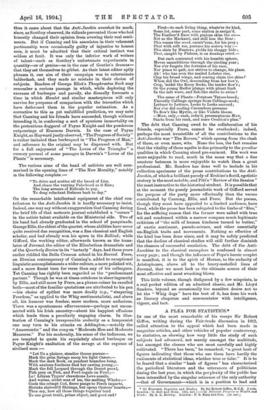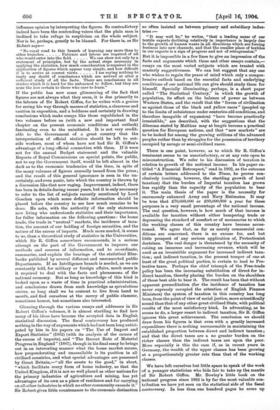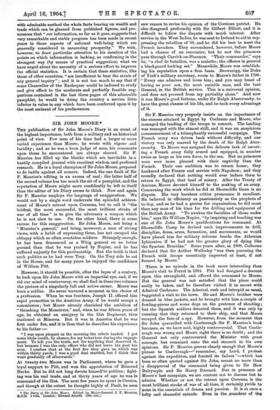"No royal road to this branch of learning any more
than to other branches Patience and labour are required of all who would enter into the field We can show not only by a statement of principles, but by the actual steps necessary in applying the statistics, how much consideration is required in the application of figures which appear very simple, and how difficult it is to arrive at correct views I am saying nothing to imply any doubt of conclusions which are arrived at after a sufficient study of all the facts. There are conclusions in all studies which it is hard for the unlearned to follow, but they are none the less certain to those who care to learn."
If the public hes now some glimmering of the fact that figures are not always what they seem, it is due primarily to the labours of Sir Robert Giffen, for he writes with a genius for seeing his way through masses of statistics, a clearness and caution in exposition, and a boldness and certainty in drawing conclusions which make essays like those republished in the two volumes before us (with a new and important final chapter on the present economic conditions and outlook) fascinating even to the uninitiated. It is not very credit- able to the Government of a great country that the interpretation of official statistics should be left to out- side workers, most of whom have not had Sir R. Giffen'a advantage of a long official connection with them. If it were not for the annual Budget statement and the valuable Reports of Royal Commissions on special points, the public, not to say the Government itself, would be left almost in the dark as to the economic tendencies of the time, in spite of the many volumes of figures annually issued from the press; and the result of this general ignorance is seen in the un- certainty, and even panic, into which the country is thrown by a discussion like that now raging. Improvement, indeed, there has been in details during recent years, but it is only necessary to refer to the list of subjects recently mentioned by Lord Goschen upon which some definite information should be placed before the country to see how much remains to be done. He asks, with the authority of the only statesman now living who understands statistics and their importance, for fuller information on the following questions the home trade, the trade in "neutral" markets, the incidence of taxa- tion, the amount of our holding of foreign securities, and the nature of the excess of imports. Much more needed, it seems to us, than a theoretical study of statistics in the Universities, which Sir R. Giffen somewhere recommends, is a serious attempt on the part of the Government to improve our methods and sources of information, and to co-ordinate, summatise, and explain the bearings of the statistical Blue- books published by several different and unconnected public Departments. If an Intelligence branch is needed, as we are constantly told, for military or foreign affairs, much more is it required to deal with the facts and phenomena of the national economy. But as long as knowledge of this kind is looked upon as a waste of time in practical administration, and conclusions drawn from such knowledge as speculations calves, ao long shall we be content to live from hand to mouth, and find ourselves at the mercy of public clamour, sometimes honest, but sometimes also interested.
Glancing through the various essays and addresses in Sir Robert Giffen's volumes, it is almost startling to find how many of his ideas have become the accepted data in English statistical discussion. The fiscal controversy has produced nothing in the way of arguments which had not been long antici- pated by him in his papers on "The Use of Import and Export Statistics" (1882) (with its analysis of the causes of the excess of imports), and "The Recent Rate of Material Progress in England" (1887), though in his final essay he brings out in an interesting manner what the home market means, how preponderating and unassailable is its position in all civilised countries, and what special advantages are possessed by Great Britain,—" all the assets to the good," in short, "which facilitate every form of home industry, so that the United Kingdom, if it is not so well placed as other nations for the primary industries of agriculture and mining, has yet advantages of its own as a place of residence and for carrying on all other industries in which no other community exceeds it." Sir Robert gives little countenance to the economic distinction " It may well be," he writes, "that a leading cause of our textile exports declining relatively in importance is largely due to the growth of human wants in all directions which are forcing business into new channels, and that the smaller place of textiles in our exports is a sign of progress and not of retrogression."
But it is impossible in a few lines to give an impression of the facts and arguments which these and other essays contain,— essays on the most varied subjects which are treated with masterly suggestiveness. We can but suggest that any one who wishes to regain the peace of mind which only a compre- hensive outlook based on the essential facts and underlying conditions of our national life can give should study them for himself. Specially illuminating,, perhaps, is a short paper called "The Statistical Century," in which the growth of population, its effect on the balance of power aa between Western States, and the result that the "forces of civilisation as against those of the black and yellow races" (peopled up to the limits of subsistence under centuries-old conditions, and therefore incapable of expansion) "have become practically irresistible," are described, with the suggestions that the dilemma stated by Malthus may at length become a practical question for European nations, and that "new markets" are to be looked for among the growing millions of the advanced peoples rather than by struggles for the possession of territory occupied by savage or semi-civilised races.
There is one point, however, as to which Sir R. Giffen's treatment seems to us unsatisfactory, or at any rate open to misconstruction. We refer to his discussion of taxation in relation to growth of the national income. In his paper en- titled "A Financial Retrospect," read in 1902, as the outcome of certain letters addressed to the TiM88, he proves con- clusively (omitting, however, the startling growth of local taxation) that the burden of Imperial taxation has grown lean rapidly than the capacity of the population to bear it. The main thesis of the paper is the necessity for enormously enhanced Army and Navy Estimates. It may be true that £70,000,000 or 280,000,000 a year for these purposes is a very small percentage of the national income. The real question, however, is how much of that income is available for taxation without either hampering trade or depressing the standard of comfort or of necessaries to which the working classes of this country have become accus- tomed. We agree that, as far as merely commercial con- ditions are concerned, there is no excuse for, and but little prospect of any serious application of, Protectionist doctrines. The real danger is threatened by the necessity of raising an immense and increasing revenue, which will be used as an irresistible argument for increased indirect taxa- tion; and indirect taxation, in the present temper of one at least of the great political parties, is certain to lead to Pro- tective taxes. Perhaps the chief triumph of the Free-trade policy has been the increasing substitution of direct for in- direct taxation, thereby placing the burden on the shoulders of those best able to bear it. The result has been that without apparent premeditation (for the incidence of taxation has never expressly occupied the attention of English Finance Ministers) the system of taxation in this country has long been, from the point of view of social justice, more scientifically sound than that of any other great civilised State, with political results of the most satisfactory kind. In advocating, as he seems to do, a larger resort to indirect taxation, Sir R. Giffen ignores this great achievement. The conclusion we should draw from his figures is that even with a greatly increased expenditure there is nothing unreasonable in maintaining the established proportion between direct and indirect taxation ; and that the direct taxes are a no greater burden on the richer classes than the indirect taxes are upon the poor. More especially is this the case if, as in recent years in Germany, the wealth of the upper classes has been growing at a proportionately greater rate than that of the working classes.
We have left ourselves but little space to speak of the work of a younger statistician who bids fair to take up the mantle of Sir Robert Giffen. Mr. Bowley's little book on the national progress since 1882 is by far the most valuable con- tribution we have yet seen on the statistical side of the fiscal controversy. In less than one hundred pages he sums up with admirable method the whole facts bearing on wealth and trade which can be gleaned from published figures, and pro- nounces that "our information, so far as it goes, suggests that very remarkable and stable progress has been made in recent years in those aspects of national well-being which are generally considered in measuring prosperity." We wish, however, to draw particular attention to his mention of the points on which information is lacking, as confirming in the strongest way (by means of practical suggestion) what we have urged about the necessity of a serious effort to improve the official statistics. It is certain that these statistics, like those of other countries, "are insufficient to bear the strain of any general inquiry"; and it is not too much to say that if some Chancellor of the Exchequer could be induced to study and give effect to the moderate and perfectly feasible seg. gestionz contained in the last three pages of this admirable pamphlet, he would be doing the country a service little inferior in value to any which have been conferred upon it by the most eminent of his predecessors.
SIR JOHN MOORE.*








































 Previous page
Previous page